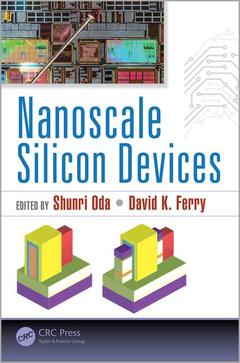Description
Nanoscale Silicon Devices
Coordinators: Oda Shunri, Ferry David K.
Language: English
Subjects for Nanoscale Silicon Devices:
Keywords
3D Structure Transistors; Coupled Si Quantum Dots; Dopant-Atom Silicon Tunneling Nanodevices; Energy-Efficient Computing; NEMS Devices; Nonvolatile Magnetoelectric Devices; Scaled MOSFETs; Self-Heating Effects in Nanoscale 3D MOSFETs; Si-Based Qubits; Silicon Nanodevices; Single Dopant Engineering; Single Electron Devices; Single-Electron Transfer in Si Nanowires; Spin-Based Qubits; Spintronic Devices; Spintronics-Based Nonvolatile Computing Systems; Thermal-Aware Device Engineering; Tri-Gate Transistors; Tunnel FETs; Variability in Scaled Devices
Publication date: 12-2015
· 15.6x23.4 cm · Hardback
Publication date: 07-2017
· 15.6x23.4 cm · Paperback
Description
/li>Contents
/li>Biography
/li>
Is Bigger Always Better?Explore the Behavior of Very Small Devices as Described by Quantum Mechanics
Smaller is better when it comes to the semiconductor transistor. Nanoscale Silicon Devices examines the growth of semiconductor device miniaturization and related advances in material, device, circuit, and system design, and highlights the use of device scaling within the semiconductor industry. Device scaling, the practice of continuously scaling down the size of metal-oxide-semiconductor field-effect transistors (MOSFETs), has significantly improved the performance of small computers, mobile phones, and similar devices. The practice has resulted in smaller delay time and higher device density in a chip without an increase in power consumption.
This book covers recent advancements and considers the future prospects of nanoscale silicon (Si) devices. It provides an introduction to new concepts (including variability in scaled MOSFETs, thermal effects, spintronics-based nonvolatile computing systems, spin-based qubits, magnetoelectric devices, NEMS devices, tunnel FETs, dopant engineering, and single-electron transfer), new materials (such as high-k dielectrics and germanium), and new device structures in three dimensions. It covers the fundamentals of such devices, describes the physics and modeling of these devices, and advocates further device scaling and minimization of energy consumption in future large-scale integrated circuits (VLSI).
Additional coverage includes:
- Physics of nm scaled devices in terms of quantum mechanics
- Advanced 3D transistors: tri-gate structure and thermal effects
- Variability in scaled MOSFET
- Spintronics on Si platform
- NEMS devices for switching, memory, and sensor applications
- The concept of ballistic transport
- The present status of the transistor variability and more
An indispensable resource, Nanoscale Silicon Devices serves device engineers and academic researchers (including graduate students) in the fields of electron devices, solid-state physics, and nanotechnology.
Physics of Silicon Nanodevices. Tri-Gate Transistors. Variability in Scaled MOSFETs. Self-Heating Effects in Nanoscale 3D MOSFETs. Spintronics-Based Nonvolatile Computing Systems. NEMS Devices. Tunnel FETs for More Energy-Efficient Computing. Dopant-Atom Silicon Tunneling Nanodevices. Single-Electron Transfer in Si Nanowires. Coupled Si Quantum Dots for Spin-Based Qubits. Potential of Nonvolatile Magnetoelectric Devices for Spintronic Applications.
Shunri Oda received his BSc in physics in 1974 and MEng and DEng from the Tokyo Institute of Technology in 1976 and 1979, respectively. He is a professor in the Department of Physical Electronics and Quantum Nanoelectronics Research Center, Tokyo Institute of Technology. He has authored more than 700 papers and edited Silicon Nanoelectronics(2005) for CRC Press. Professor Oda is a fellow of the Institute of Electrical and Electronics Engineers (IEEE) and the Japan Society for Applied Physics, a member of the Electrochemical Society and the Materials Research Society, and a distinguished lecturer at the IEEE Electron Devices Society.
David K. Ferry received his BSEE and MSEE from Texas Tech University, Lubbock, in 1962 and 1963, respectively, and PhD from the University of Texas (UT), Austin, in 1966. His research interests include transport physics and modeling of quantum effects in ultra-small semiconductor devices. Dr. Ferry is a fellow of the American Physical Society, the Institute of Electrical and Electronics Engineers, and the Institute of Physics (UK). He has published numerous articles, books, book chapters, and conference papers, serves as editor of the Journal of Computational Electronics, and is an admiral in the Texas Navy and the Tennessee Squire Association.




